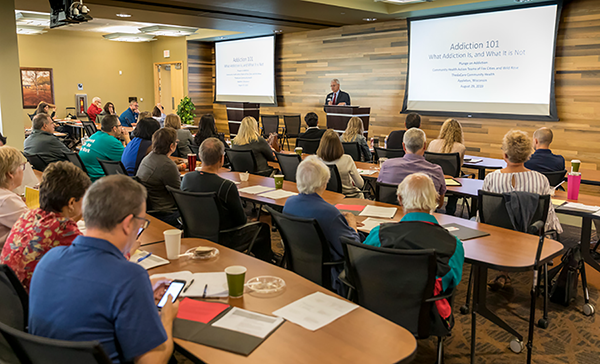 Both the Fox Cities and Wild Rose Community Health Action Teams identified Recovery Coaching as a strategy that would help reduce opioid addiction.
Both the Fox Cities and Wild Rose Community Health Action Teams identified Recovery Coaching as a strategy that would help reduce opioid addiction.Every three years, ThedaCare completes a comprehensive Community Health Needs Assessment (CHNA) and a Community Health Improvement Plan (CHIP) for each of its seven hospitals. In the most recent assessment, all seven plans clearly identified substance use as one of the top three health concerns in the ThedaCare service area, and this is largely driven by prescription opioids.
ED2R+ Program Planning
In August 2019, ThedaCare Community Health Action Teams (CHAT) from Wild Rose and Fox Cities, hosted a plunge on Addiction. A plunge is a day-long event where diverse CHAT team members gather those most affected by or involved in solving an issue, work together to share knowledge and develop solutions for change. After the plunge and debrief, both the Fox Cities and Wild Rose teams identified recovery coaching as a strategy that would help reduce opioid addiction by encouraging people to seek treatment and avoid recidivism.
After months of dedicated planning, ThedaCare is pleased to announce the Emergency Department to Recovery Plus (ED2R+) program. ThedaCare is partnering with Apricity to initially offer the program at ThedaCare Medical Center-Berlin, ThedaCare Regional Medical Center-Neenah and ThedaCare Medical Center-Shawano.
“When we learned about the ED2R+ program and successes, we recognized the opportunity to leverage the partnerships at the table, including ThedaCare’s emergency departments,” said Tracey Ratzburg, ThedaCare community health coordinator. “When someone comes to the ED in the middle of an addiction crisis, it is often the end of the road, they don’t know where else to go. ED2R+ offers hope and support from a peer that walked a similar journey.”
The ED2R+ program model offers peer support services by recovery coaches or certified peer support specialists. These services offer referrals, support, and follow up for treatment and recovery to individuals who have history of or experienced an opioid or stimulant overdose and are taken to the emergency department. Recovery coaches and certified peer support specialists may also offer services outside of emergency department settings including through EMT services, first responders, public health departments, probation and parole offices, law enforcement and treatment and/or recovery centers. This statewide peer support network functions as a component of the State Opioid Response.